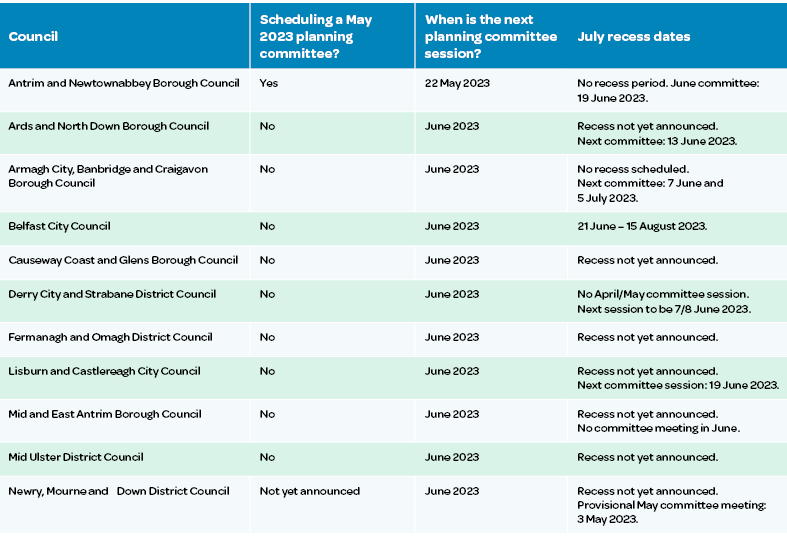John Davison
Director, Head of Strategic Communications
What are you looking for?
Council elections create charged political conditions in which planning issues can become controversial. They also disrupt the normal running of council's processes, with delays affecting planning applications.
In this comment, we seek to provide a clearer understanding of these impacts and provide a road map through the election process. We also flag the key dates and obstacles to navigate throughout this period.
Whilst every election is important, this particular election is important for a number of key reasons.
Voting will open on Thursday 18 May at 7am and will run until 10pm that evening. Unlike what we would normally see during a Westminster Parliamentary or NI Assembly election, the ballot boxes will be opened on the morning of Friday 19 May and the counts across the 11 councils will begin. Depending on the speed of the counts across the country, we will start to see the results come in from mid-morning onwards.
By the evening of Friday 19 May, we should have the majority of councillors elected with the final few to come later that evening and, if required, into Saturday 20 May 2023. By the following Monday, all 462 councillors will have been elected across Northern Ireland and councils, and parties can begin the process of allocating seats across the various committees.
A full timeline of the key dates leading up to and after the local elections can be found here.
It is important that we have a clear understanding of how they will affect the operations and proceedings of the planning process. The area that will be impacted the most will likely be the public facing planning committee sessions in May.
Most councils have taken the decision to suspend May planning committee sessions in favour of waiting until a new committee is formed in the post-election period. Set out below is a breakdown for each of the 11 councils and whether they intend to hold a planning committee session in May. However, with many councils in recess in July and August, and new councillors required to train for their new quasi-judicial roles on the planning committee, it might be a struggle for some complex applications to be determined before August.

If you have an application in the planning system and are keen to understand the potential impact that the Local Government elections may have, then please contact a member of our Planning or Strategic Communications team listed below.
The rationale and reasoning for the restrictions on the planning system can be traced back to guidance issued by the Northern Ireland Local Government Association (NILGA). The ‘Pre-Election Period’, is a period of heightened sensitivity leading up to an election.
During this period which, often starts around six weeks before the date of the election, councils and other public bodies will limit public facing activities or suspend consultative processes which may impact, influence or in some manner effect the election including its outcome.
If you would like to read more about the Pre-Election Period, more information can be found here via the Northern Ireland Local Government Association (NILGA).
In the lead up to the Local Government elections and in the days following, we will be sharing a number of articles taking a look at key issues coming out of the election.
The goal is to give anyone interested in planning, development or politics more generally, a strong understanding of the key issues and moments to watch for throughout the campaign.
If you wish to know more about the campaign or how you or your business can effectively navigate the impact of the 2023 Local Elections, please reach out to Senior Consultant, Jack Gibson or Consultant, Michael Jardine.
24 April 2023
Director, Head of Strategic Communications
20 April 2023
Acting for Heron Bros on behalf of Sysco Ireland, Turley has secured planning permission from Antrim and Newtownabbey Borough Council’s Planning ...